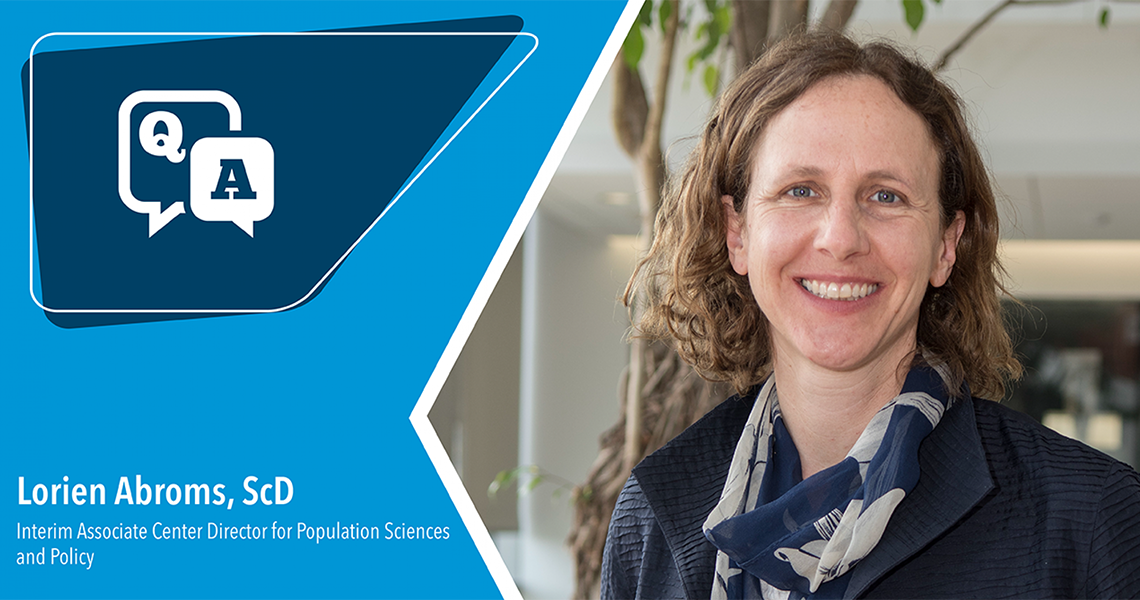Dr. Abroms is an expert in cancer prevention and applying communication technology to address tobacco cessaation. As founding director of the GW mHealth Collaborative, Dr. Abroms has been instrumental in fostering collaboration across GW and raising the profile of mHealth. As interim associate center director for population sciences and policy, Dr. Abroms collaborates with faculty across GW in creating a vision for public health within the GW Cancer Center and manages initiatives to promote cancer research collaborations across the university.
What brought you to GW?
I came to GW after a post-doc at the NIH. One of the faculty members who attracted me to GW’s new School of Public Health was Dr. Richard Windsor, who had done some of the seminal trials on smoking cessation in pregnant women. I came as one of the first tenure-track faculty in the Department. That was almost 15 years ago.
How did you decide on a career in public health?
I was in a doctoral program in Sociology at Brown University and wanted to be in a more applied field. My advisor at the time recommended I looking into public health, and I got really excited when I realized that my training in sociology and psychology was really relevant to pressing public health problems.
If you weren't in public health, what would you be doing?
Something else related to program design and/or communication.
What inspires you most about your work?
That the programs that I build with my team have the potential to be widely disseminated and help populations.
What is a current project or work you are excited about and why?
I am starting a new project funded by Cancer Research UK to mine Electronic Health Record Data for people at high risk for cancer (e.g. smoking, risky drinking) and to then offer them evidence-based digital interventions for health behavior change.
In addition to your work in population sciences and policy, you also oversee the GW mHealth Collaborative. Can you tell us a little about that group and why it’s important?
The George Washington University mHealth Collaborative is an interdisciplinary group with representation from GW faculty in public health, clinical medicine, biostatistics, and engineering. Members of the group have developed and/or tested mobile health applications for improving health, including but not limited to the areas of smoking cessation, hypertension, bipolar disorder, diabetes, peritoneal dialysis and prenatal health. It was co-founded by myself and Dr. Bianca Frogner in 2012. Our most recent event was a symposium on social media and public health.
The Great American Smokeout is this month (November 15th), and it’s a great time for people to think about quitting smoking or using tobacco. Based on your research and experience, what works when it comes to motivating people to quit, and what do you wish more people knew?
There is so much help that is proven to work and free to the end user (e.g. paid for by insurance or State health departments), including phone counseling, text messaging programs, and medications. A great place to start in quitting is to call 1-800-QUIT-NOW or visit Smokefree.gov. The quit line counselors will call you back up to 4 times and offer additional counseling as needed; It’s a great service but highly underutilized.
What makes the GW Cancer Center unique when it comes to population-level research?
We have strengths in policy (for example, in obesity prevention policies); tobacco control and smoking cessation and around the link between environmental exposures and cancer. We are also unique in our attention to health disparities (e.g. LGBTQI community) and in our use of digital technologies for cancer-related health behavior change.
What advice would you give to an aspiring public health student who wants to work in your field?
I would say to design cancer prevention programs with dissemination in mind, that is, to design around one promising plan for how your program will get to its intended audience. I would also say to make sure that what you are asking people to do within your program is as simplified as possible and that you could visualize how they would be able to do it given the constraints of their current life.




